|
Bob's Long Long Long bio page II
October 1978: Arriving at my friends' place in Denver with my bass and amp, I went out and pinned a notice on the bulletin board of the first music store I encountered: Bobby's Music on East Colfax: “Bass player wants to form or join original band. Influences: Beatles, Yes, Henry Cow”. Later that same day, someone phoned: guitarist and composer Mike Johnson. He came over and showed me some of his ideas, we even recorded something, ping-ponging between two cassette decks. We had an instant rapport and became best friends, soon renting a small house together on the then outskirts of Denver (to be more accurate, Mike rented it, and I kept promising to get a job and pay half!) There in the basement we began making recordings by bouncing between a cassette deck and a stereo reel-to-reel tape recorder. Recording that way, every additional instrument we added meant one more tape generation, so they had a curious, decayed sound by the end! I quickly learned a lot about how to record, say, the drums, so that after the other instruments were all added, and the drums were now several tape generations further along and their level could not be adjusted anymore, they'd still be surprisingly clear and audible. This way of recording also taught me to recognise quickly when a performance is "good"; not fuss over little "imperfections" which often bring life to a recording. I'd encourage unexpected things to happen: while Mike was recording a guitar part I would drop a cymbal or throw an empty can towards the microphone, hoping to make him laugh or do something funny in response on the guitar. We wanted a name for our project: I suggested Pleasant Pestilence, but a few days later Mike wanted to call it Thinking Plague which I thought wasn't as funny, but that's what stuck.
|
|
Mike and I began playing in cover bands together, ZZ Top, Bob Seeger, Lynyrd Skynyrd...in the rather woebegone hope of somehow making a living from music. One of these bands signed up with an agency who set up gigs around the region, sending us out to remote, lonely spots in eastern Colorado and western Kansas - bowling alleys, small-town high school dances, that sort of thing, some were literally wide places in a country road with a bar. Musically it was as dismal as you could get, but I liked spending a day or two in these quiet, lonely, windswept rural towns out on the plains, with their rusty train tracks and rickety old buildings. Needless to say however, that wasn't getting us anywhere with our music, and I attempted to keep body and soul together working temporary labour jobs. I'd show up at 5AM down near skid row at what we called the "Rent-a Bum" office, strategically placed in between one of those ripoff check cashing/loan places and a run-down bar. I would be just one of maybe 20 or so assorted others: all of us a sorry-looking bunch of bums, alcoholics, desperate or down-on-their-luck guys, the occasional belligerent thuggish type, all united in the pathetic hope of making a few bucks. We'd sit and wait. "I need three men to shovel mud out of a flooded basement" or "Two men with strong stomachs to help demolish a rendering plant, " or maybe "A man to carry 50-pound chunks of broken concrete up stairs for 8 hours". All (who could manage to) would raise a hand, and the guy behind the counter would select the lucky batch. If you scored a day's work I think the final paycheck was 18 dollars. Like all the others I didn't have a bank account, so I'd cash my check at the check cashing place next door, who took something like 5 dollars for the favour. Lots of the guys would go to the bar next door, where they would cash your check "for free", if you bought a drink... I would do these temp jobs on and off for the ten years I lived in Denver. Another way to make a dollar was to spend the day walking in the ditches along the highways, sorting through the rubbish people had chucked out of their car windows, and collecting the cans to put into the mechanical "can banks" which were around for a while in those days. They didn't last long because people would try forcing anything made of metal into the things, so they were often out of order. But on lucky days they did work and a full binbag of cans would get you something like a dollar, not as well-paying as the rent-a-bum temp jobs, but at least I wouldn't have to put up with the tough guy pack mentality at construction sites or factories. The can bank might pay for a couple packets of generic ramen noodle soup and a bottle of cheap beer, so I'd be quite well-off for a couple of days. (If I'd known then what I know now about edible plants, I could have been making all the free salads I could eat!) The condiments section in the 7-11 shops was always handy for free packets of ketchup, if one were extra hungry!
In late 1978 I mentioned to Mike I wanted to try doing completely improvised live music with a group. He knew someone we could do
that with, and introduced me to Lin Esser, a very talented artist, musician and songwriter. He was connected with a Denver venue called Jae Ram Loft and set up a few gigs for us there. My
That was exactly what I had needed. For the next decade I played bass or drums and sometimes guitar in countless bands and one-off projects, all kinds of funny and crazy live shows. In 1981, synth player Geoff Landers joined Lin Esser and me in group called called Crank Call Love Affair, and I ended up living at Geoff's place for a while, where he had a little attic studio with a TEAC 3340 4-track tape recorder. There, in this tiny, bare-bones attic studio, I made several recordings of local bands and our own groups, the quality of which so impressed Geoff that he decided to set up a “real” studio where I would be the engineer. It sounded like a dreamy idea! Unlike myself and most of the other musicians I knew, Geoff was not penurious, he could actually do this, and rented an empty old office building in the slaughterhouse and stockyards district of Denver for the purpose. I have heard this building described as a former meat-packing plant, but it wasn't, it had been an administrative office building, though it was indeed right there in the midst of the rendering plants and slaughterhouses, with some incredible post-apocalypse-looking abandoned factories, which I loved exploring, all around. The stench of the whole area took some getting used to though!
|
|
After having pressed a dozen or so of these Packing House-made records, the pressing facility (I think they were based in Wyoming) suddenly told us NO MORE, appalled by the production (or anti-production) and subject matter of our recordings. They feared we were giving them a bad reputation! A look at their catalog showed their conservative Christian leanings, and it later became a bit of local legend how the Denver freaks frightened off the straight record pressing people! But a previously hidden door had been opened and we realized there were many of these small pressing facilities dotted around the country and it wasn't too far out of the reach of most groups to afford pressing a few hundred records, if you were willing to skip paying the rent, or if someone in the band had a paying job! |
 At the left is one of the few photos from The Packing House - the drumkit I played, rather stiffly, on this song on Geoff's album Habitual Features, and this one which also features Paul Haugen on Chamberlin. Like the Mellotron which came later, the Chamberlin was a keyboard instrument which utilised tapes, triggered by the keys. On this recording I also had microphones inside of the instrument to pick up the sound of the tape mechanism as he played.
At the left is one of the few photos from The Packing House - the drumkit I played, rather stiffly, on this song on Geoff's album Habitual Features, and this one which also features Paul Haugen on Chamberlin. Like the Mellotron which came later, the Chamberlin was a keyboard instrument which utilised tapes, triggered by the keys. On this recording I also had microphones inside of the instrument to pick up the sound of the tape mechanism as he played.
|
 When there was no other work going on at The Packing House I could use it myself, so over some months in 1982-83 Mike Johnson and I recorded most of the first Thinking Plague album ...a Thinking Plague there. At the right you see the studio's mixing desk, with my very own hands upon it, during a Plague session. The desk sat on a little counter which ran partway around the room. Under this counter was a space about a meter high, where cases and various things were stored, including
Geoff's Arp 2600 synthesizer which I used for that mournful synth melody that happens twice in the song Possessed at 4:48 and 6:07. I remember crawling down under the counter where I had to awkwardly lie down to play it, it seemed appropriate somehow to get the vibe I was looking for!
When there was no other work going on at The Packing House I could use it myself, so over some months in 1982-83 Mike Johnson and I recorded most of the first Thinking Plague album ...a Thinking Plague there. At the right you see the studio's mixing desk, with my very own hands upon it, during a Plague session. The desk sat on a little counter which ran partway around the room. Under this counter was a space about a meter high, where cases and various things were stored, including
Geoff's Arp 2600 synthesizer which I used for that mournful synth melody that happens twice in the song Possessed at 4:48 and 6:07. I remember crawling down under the counter where I had to awkwardly lie down to play it, it seemed appropriate somehow to get the vibe I was looking for! Then there's the faster middle bit of Possessed starting at 3:11 with the two drum kits. For this, Mark Fuller and I set up our kits facing each other, bass drums almost touching, and I placed one microphone above each kit. We played at the same time, just recorded with those two overhead microphones, it was quite a blast and we were both making each other laugh the whole time. However, my little dream of being able to pay my 75 dollars a month rent on a roach-infested single room apartment by doing recording sessions never materialized, most of bands who came there to record were as broke as I was, and trying to keep it going was taking its toll on Geoff. It ended after a couple of years, but in that time Geoff also recorded his two much-sought-after LPs The Ever-Decimal Pulse and Habitual Features, we did most of the first Thinking Plague record, and it was there that Susanne Lewis and I first worked together, when she came in to record some of her songs.
We had the records, now what? We sent a copy to Recommended Records in London, because they distributed other records we liked such as Art Bears, hoping they'd take some of ours. A letter soon came back from none other than Chris Cutler, whose drumming I had admired since hearing Henry Cow’s Unrest back in 1974. I had no idea that Recommended was in fact his own label! He asked for 200 copies, and even paid for the postage. Wayside Music in the USA took some as well. This was a good beginning! Most people we sent it to seemed intrigued by it, and one or two music magazines gave it good reviews. It was in one of those reviews I first saw the terms “RIO” and “Rock In Opposition”. Mike and I didn’t know what it meant until years later. In any case, ...a Thinking Plague was the first time anyone outside Denver took any notice of what we were doing.  Soon we started the second album Moonsongs, with me on bass and drums, singer Susanne Lewis, keyboardist Eric Moon, and drummers Mark Fuller and Mark McCoin. Mike and I had been enthralled at the time by the somewhat mechanical, inhuman production of some mid-80’s pop, and wanted to try to make an album with that flavour, using the very limited equipment at our disposal. The studio had a Linn drum machine, the thick, dead-sounding sampled drums heard on many pop records of the day. I had an idea for it on our song Warheads, but couldn't understand how to make it do anything, you had to know about SEQUENCING, the sort of thing that just gives me a migraine. We managed to use it a little, because Mike was able to make it do something, though by then I was thinking "wouldn't it have been quicker, easier, and sound better just to hit a cardboard box?" But we had decided to use it, and so we did, along with some other very primitive sampling, which seemed mysterious, exciting and futuristic at the time.
Soon we started the second album Moonsongs, with me on bass and drums, singer Susanne Lewis, keyboardist Eric Moon, and drummers Mark Fuller and Mark McCoin. Mike and I had been enthralled at the time by the somewhat mechanical, inhuman production of some mid-80’s pop, and wanted to try to make an album with that flavour, using the very limited equipment at our disposal. The studio had a Linn drum machine, the thick, dead-sounding sampled drums heard on many pop records of the day. I had an idea for it on our song Warheads, but couldn't understand how to make it do anything, you had to know about SEQUENCING, the sort of thing that just gives me a migraine. We managed to use it a little, because Mike was able to make it do something, though by then I was thinking "wouldn't it have been quicker, easier, and sound better just to hit a cardboard box?" But we had decided to use it, and so we did, along with some other very primitive sampling, which seemed mysterious, exciting and futuristic at the time.
It's true some of what we did on the Moonsongs recording was remarkable, considering the bare-bones, often cobbled-together equipment we used, and Eric Moon certainly coaxed sounds out the Yamaha DX7 keyboard I never heard anyone else get, but the novelty of the sound direction had, for me anyway, worn off before we finished it. Mike felt somewhat the same and we later returned to the studio, replacing some of the title track's more digital-sounding keyboards with plain old organ and piano, and mixed it again with less reverb and effects, but somehow it wasn't really "better"...it was a relief when we did the live, completely non-produced track Etude for Combo for the album! But there it was, our second album, we'd done what we'd set out to do, get something of the current sound in a Plague-ey way, and it didn't sound like the first album. It was pressed and released by a label who went out of business practically at the same time, I don't even remember if we ever got any of the LPs. I know we sold a few cassettes ourselves, at Wax Trax in Denver and through our short-lived attempt at a mail-order catalogue "Endemic Music", but it probably wasn't much known until it was re-released on the Early Plague Years CD in 2000, by which time it really sounded like the mid 80's!
|
|
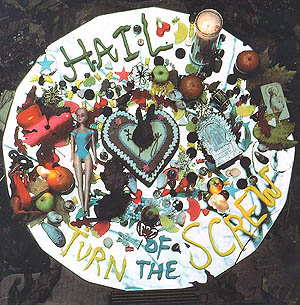 About this time, an acquaintance who ran a service providing PA sytems for bands asked me
to help make the sound effects for a Halloween “haunted house”, which I did. Amazed
at what I came up with using one cheap microphone and a cassette deck, he introduced me to
someone who was starting up a local film company, making their first, low-budget
comic/horror film. I ended up helping out, making sound effects, a little bit of music, and mixing a
couple of their films. They had some audio equipment including two Fostex 8-track tape machines and
a 16-channel Soundcraft mixing desk, set up in a little room at the end of the hallway. Since they
could barely pay me, and then only when there was actual film work to do, they'd let me use the gear when
nothing was going on, which was most of the time! Susanne Lewis and I recorded much of Turn of the Screw there.
About this time, an acquaintance who ran a service providing PA sytems for bands asked me
to help make the sound effects for a Halloween “haunted house”, which I did. Amazed
at what I came up with using one cheap microphone and a cassette deck, he introduced me to
someone who was starting up a local film company, making their first, low-budget
comic/horror film. I ended up helping out, making sound effects, a little bit of music, and mixing a
couple of their films. They had some audio equipment including two Fostex 8-track tape machines and
a 16-channel Soundcraft mixing desk, set up in a little room at the end of the hallway. Since they
could barely pay me, and then only when there was actual film work to do, they'd let me use the gear when
nothing was going on, which was most of the time! Susanne Lewis and I recorded much of Turn of the Screw there.
|
|
Last time I talked to Mike about this he didn't agree, but I say the album's two songs we recorded at a proper 16-track studio don't sound nearly as good as the ones recorded in the rehearsal room with Radio Shack mics and no mixer or nothin'. I won't mention which are which. What do your ears say? |
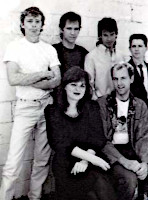 In 1987, the Plague did a show in Denver with the lineup pictured here: Mark Fuller, Mike, Susanne, Lawrence Haugseth, me and Eric Moon. There are videos of this show, though the videotape cameras of those days didn't handle the stage lighting very well!
In 1987, the Plague did a show in Denver with the lineup pictured here: Mark Fuller, Mike, Susanne, Lawrence Haugseth, me and Eric Moon. There are videos of this show, though the videotape cameras of those days didn't handle the stage lighting very well!
|
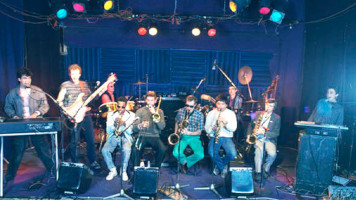 Another noteable 80’s Denver group I was in was The Bruce Odland Big Band. A 5-piece horn section,
two drummers, two singing keyboardists, and me on bass. Between 1985-88 we did many gigs in Denver and Boulder, and
made a not very representative and overproduced (by us!) record, Crossover. In 1987 were invited to be
part of a "Sister Cities Cultural Exchange" with Singapore, which meant we spent a week there, doing
two shows a day in places like the botanic gardens, music halls, theatres, even a stage in the
middle of big shopping mall. That was the first time I was outside the USA, I might add. It was in this group that Mark Harris and I first met, he joined Thinking Plague soon after.
Another noteable 80’s Denver group I was in was The Bruce Odland Big Band. A 5-piece horn section,
two drummers, two singing keyboardists, and me on bass. Between 1985-88 we did many gigs in Denver and Boulder, and
made a not very representative and overproduced (by us!) record, Crossover. In 1987 were invited to be
part of a "Sister Cities Cultural Exchange" with Singapore, which meant we spent a week there, doing
two shows a day in places like the botanic gardens, music halls, theatres, even a stage in the
middle of big shopping mall. That was the first time I was outside the USA, I might add. It was in this group that Mark Harris and I first met, he joined Thinking Plague soon after.
|
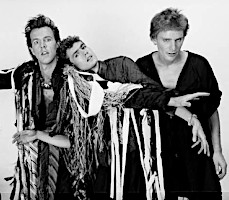
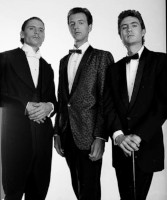 Here are two of the photos taken for the Crossover album, it's the rhythm section - me and drummers Mark Fuller and Mark McCoin. On the left is how we'd typically dress for a show, on the right wearing 1930's suits provided by the photographer for the session. Bandleader Bruce had one too, and after the photo session the four of us, still in heavy makeup and vintage suits, went downtown and just to see what would happen, strolled to the door of Denver's ritziest restaurant, the sort of place we scruffy bohemians would be sneered at just passing by the red-carpeted sidewalk. In our makeup and suits we were immediately seated and fussed over, ordered a few overpriced drinks (thanks to Bruce) and as we left a staff member accompanied us to the door, thanking us for "bringing a touch of elegance" to their establishment. It was funny but very strange, and we hardly knew what to make of the experience.
Here are two of the photos taken for the Crossover album, it's the rhythm section - me and drummers Mark Fuller and Mark McCoin. On the left is how we'd typically dress for a show, on the right wearing 1930's suits provided by the photographer for the session. Bandleader Bruce had one too, and after the photo session the four of us, still in heavy makeup and vintage suits, went downtown and just to see what would happen, strolled to the door of Denver's ritziest restaurant, the sort of place we scruffy bohemians would be sneered at just passing by the red-carpeted sidewalk. In our makeup and suits we were immediately seated and fussed over, ordered a few overpriced drinks (thanks to Bruce) and as we left a staff member accompanied us to the door, thanking us for "bringing a touch of elegance" to their establishment. It was funny but very strange, and we hardly knew what to make of the experience.
|
|
|
|
Now we're up to late 1988. My decade in Denver had been a giant step in my continuing muscial education, having met and played with some of the best musicians I’ve known: Mark Fuller, Susanne Lewis, Mike Johnson, Mark McCoin, Ron Miles, Eric Moon and Bruce Odland to name a few, while simultaneously being a constant struggle to pay the rent, even to eat on a daily basis. Given the choice of working 9-5 hoping to pay the bills and have "leftover" time for music, or being hungry at a rehearsal room tinkering with tapes and instruments, I’d always taken the latter road and didn’t complain. No matter how grim the surroundings and situation, even when I had nowhere to live and slept in the rehearsal room, I was always strangely happy inside...maybe something is wrong with me! However by winter of 1988 I’d really had enough of going to bed hungry every night, tattered clothes and holey shoes, looking for coins in the newspaper boxes and coin-op car washes along East Colfax, and all just because I simply wanted to spend my time making music. During that last year in Denver, I had a part-time job helping a guy wash cars in the parking lots of their owners’ workplaces – we would do this even in January, in Denver, when the temperature was below freezing, my shoes full of holes, torn coat that didn’t button, I felt I was dying, spiritually and physically, while the other guy was merrily whistling, working away without a care...I saw his hands – they were swollen, cracked and fissured as if they’d been frozen and thawed over and over for years. He didn't notice - just wanted to make his few dollars and get some beer. Bands and musical projects were fewer and far between, some of my former music partners, notably Mark Fuller and Susanne Lewis, had moved far away. I wasn’t as interested in the new Thinking Plague music Mike Johnson would occasionally show me as I would have been years previously. I wanted to find my own music, whatever that was. I also knew I was a very good engineer, but couldn’t get a single engineering gig in any Denver studio. I couldn’t afford a telephone, how could they even phone to tell me? I wasn’t asking much - just to make music, have a room and not starve, but could see nothing coming down this road but more poverty, temporary labor jobs, hiding from landlords, and walking the industrial zones futilely filling out "unskilled" job applications at every warehouse and factory, knowing they wouldn't be able to phone me even if they'd picked my application from the drawerfull. Now and then I'd get a fruitless interview on the spot: '...so, Mr....aah...DRAKE...what are some of the things that qualify YOU for a career as janitor here at the Mountain States Door warehouse?" What the hell. I decided to take my chances in LA.
Go to page 3 |
 While Mike would be out working at his job during the day, I could usually be found in the basement, happy playing around with the instruments and tape recorders. I loved taking solitary walks, wandering around downtown, nearly deserted in those days, the somehow always forlorn East Colfax, the rusting viaducts over the lonely railyards...often dreaming about music yet to come, whatever that might be! It all seems like a period of internal preparation, it's hard to describe this somewhat mystical feeling.
While Mike would be out working at his job during the day, I could usually be found in the basement, happy playing around with the instruments and tape recorders. I loved taking solitary walks, wandering around downtown, nearly deserted in those days, the somehow always forlorn East Colfax, the rusting viaducts over the lonely railyards...often dreaming about music yet to come, whatever that might be! It all seems like a period of internal preparation, it's hard to describe this somewhat mystical feeling.
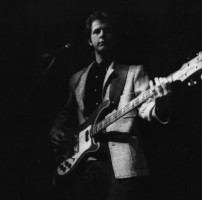 younger brother Dave, a drummer, had also recently moved to Denver, so we asked him to join, and
the four of us did several improv gigs together between 1978 and 1980 as The Ganglion Orchestar. Some were the worst imaginable
kind of awful rock improvisation, others were quite transcendental and magic. You can
younger brother Dave, a drummer, had also recently moved to Denver, so we asked him to join, and
the four of us did several improv gigs together between 1978 and 1980 as The Ganglion Orchestar. Some were the worst imaginable
kind of awful rock improvisation, others were quite transcendental and magic. You can 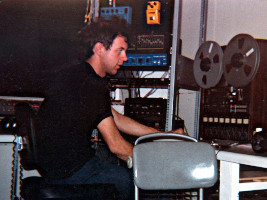
 Geoff equipped the large room in
the basement with an 8-track recorder and mixing desk, a few microphones and some stomp-box effect
pedals, and soon I was recording a string of records for many of the Denver area’s more artsy,
punky, noisy, and/or just plain weird bands.
Geoff equipped the large room in
the basement with an 8-track recorder and mixing desk, a few microphones and some stomp-box effect
pedals, and soon I was recording a string of records for many of the Denver area’s more artsy,
punky, noisy, and/or just plain weird bands.
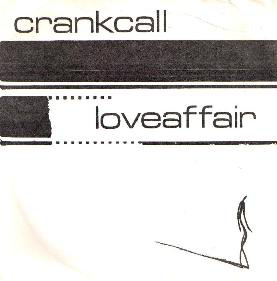 The first group I recorded there was the new lineup of Crank Call Love Affair, the band I'd been in with Lin Esser and Geoff. Now it was a trio with Lin on bass and vocals, guitarist Randy Walters, and Mark Fuller drumming. We recorded two songs, they were amazed at the big sound I got from the minimal gear (but a nice revererant room!) and had a boxfull of 45 RPM records pressed by a small independent pressing facility, their
The first group I recorded there was the new lineup of Crank Call Love Affair, the band I'd been in with Lin Esser and Geoff. Now it was a trio with Lin on bass and vocals, guitarist Randy Walters, and Mark Fuller drumming. We recorded two songs, they were amazed at the big sound I got from the minimal gear (but a nice revererant room!) and had a boxfull of 45 RPM records pressed by a small independent pressing facility, their 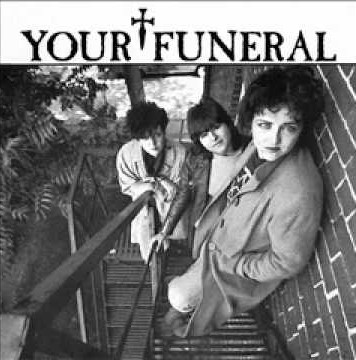 Your Funeral, Susan and God, Young Weasels, Jeri Cain Rossi, Spray Pals, Thinking Plague, Geoffrey Landers...
Your Funeral, Susan and God, Young Weasels, Jeri Cain Rossi, Spray Pals, Thinking Plague, Geoffrey Landers... 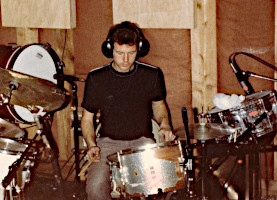
 The Packing House out of the picture, Mike and I recorded the final song of the Plague album,
The Packing House out of the picture, Mike and I recorded the final song of the Plague album, 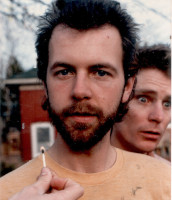 I was part of many short-lived groups and one-off things all throughout the 80’s, some of which were at least curious or worth a gander,
like
I was part of many short-lived groups and one-off things all throughout the 80’s, some of which were at least curious or worth a gander,
like 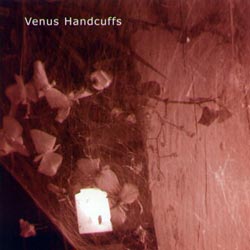 Susanne Lewis and I did some interesting projects together in the early-mid 80's, one of them being
Susanne Lewis and I did some interesting projects together in the early-mid 80's, one of them being 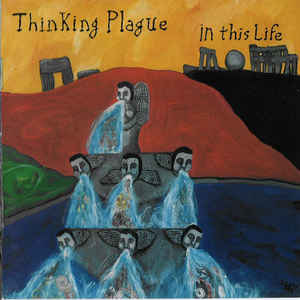 Because the film company's office was just a few blocks from our rehearsal space, I’d frequently carry one of the tape machines over and used it to record much of Thinking Plague’s In This Life, there in our rehearsal room in 1987-88. To me, up until then, that was the best TP album, musically, lyrically, and sonically. Most of it was recorded with a few Radio Shack mics, and a 4-channel Teac home stereo mixer, basic as you can get. We had good songs and a good band. Even the most “produced” song, Organism, was
done with very little equipment.
Because the film company's office was just a few blocks from our rehearsal space, I’d frequently carry one of the tape machines over and used it to record much of Thinking Plague’s In This Life, there in our rehearsal room in 1987-88. To me, up until then, that was the best TP album, musically, lyrically, and sonically. Most of it was recorded with a few Radio Shack mics, and a 4-channel Teac home stereo mixer, basic as you can get. We had good songs and a good band. Even the most “produced” song, Organism, was
done with very little equipment.
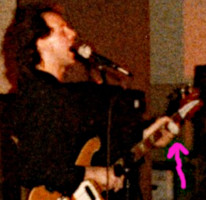 In 1986 while loading the gear into the van after a gig with the just-described group, a heavy keyboard in a flight case fell on my hand and severed the tip of the middle finger at the base of the nail.
It wasn't exactly painful, but in the milliseconds between the event and looking at the hand, I had already said to myself
"Right, got to learn a new way to play!" I had lots of gigs coming up.
It took a while, but I learned to not use the middle finger, and for a long time when playing bass I'd keep it wrapped in cotton - as you can just make out in this photo from 1986 with helpful pink arrow -
just in case I'd fret a note by accident. The tip was hyper-sensitive for months and it was like a violent electric shock if it touched a string.
Eventually I learned not use it, and played for years with just the other three fingers.
In 1986 while loading the gear into the van after a gig with the just-described group, a heavy keyboard in a flight case fell on my hand and severed the tip of the middle finger at the base of the nail.
It wasn't exactly painful, but in the milliseconds between the event and looking at the hand, I had already said to myself
"Right, got to learn a new way to play!" I had lots of gigs coming up.
It took a while, but I learned to not use the middle finger, and for a long time when playing bass I'd keep it wrapped in cotton - as you can just make out in this photo from 1986 with helpful pink arrow -
just in case I'd fret a note by accident. The tip was hyper-sensitive for months and it was like a violent electric shock if it touched a string.
Eventually I learned not use it, and played for years with just the other three fingers.
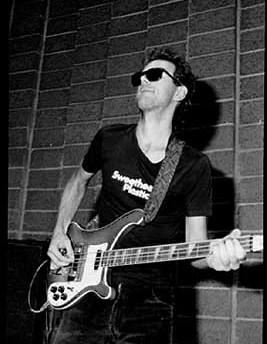 After a few more years I could use all four again on the bass, but not guitar, where the oddly-shaped fingertip wouldn't fit between the strings except on a classical
guitar, where the necks are often nice and wide. This accident was actually a positive thing in the end and made me use different kinds of guitar chords and tunings, and to this day I play standard guitars chords with an unusual fingering. Having had the experience once already of re-learning to play in a different way will stand me in good stead for dealing with a new potential playing impediment which has arisen...more about that later!
After a few more years I could use all four again on the bass, but not guitar, where the oddly-shaped fingertip wouldn't fit between the strings except on a classical
guitar, where the necks are often nice and wide. This accident was actually a positive thing in the end and made me use different kinds of guitar chords and tunings, and to this day I play standard guitars chords with an unusual fingering. Having had the experience once already of re-learning to play in a different way will stand me in good stead for dealing with a new potential playing impediment which has arisen...more about that later!
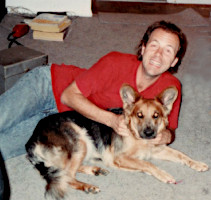 As fate would have it, a
Venice Beach-dwelling friend who had once lived in Denver was in town, and offered to give me a lift
back to LA in his van (which he also lived in) so I gave away my few non-musical belongings, stashed my
music gear in Mike Johnson’s basement, and in October 1989, me and my dog Elva, who I’d found five years earlier as
a half-frozen, starving puppy in the abandoned railyards, rode out to LA.
As fate would have it, a
Venice Beach-dwelling friend who had once lived in Denver was in town, and offered to give me a lift
back to LA in his van (which he also lived in) so I gave away my few non-musical belongings, stashed my
music gear in Mike Johnson’s basement, and in October 1989, me and my dog Elva, who I’d found five years earlier as
a half-frozen, starving puppy in the abandoned railyards, rode out to LA.